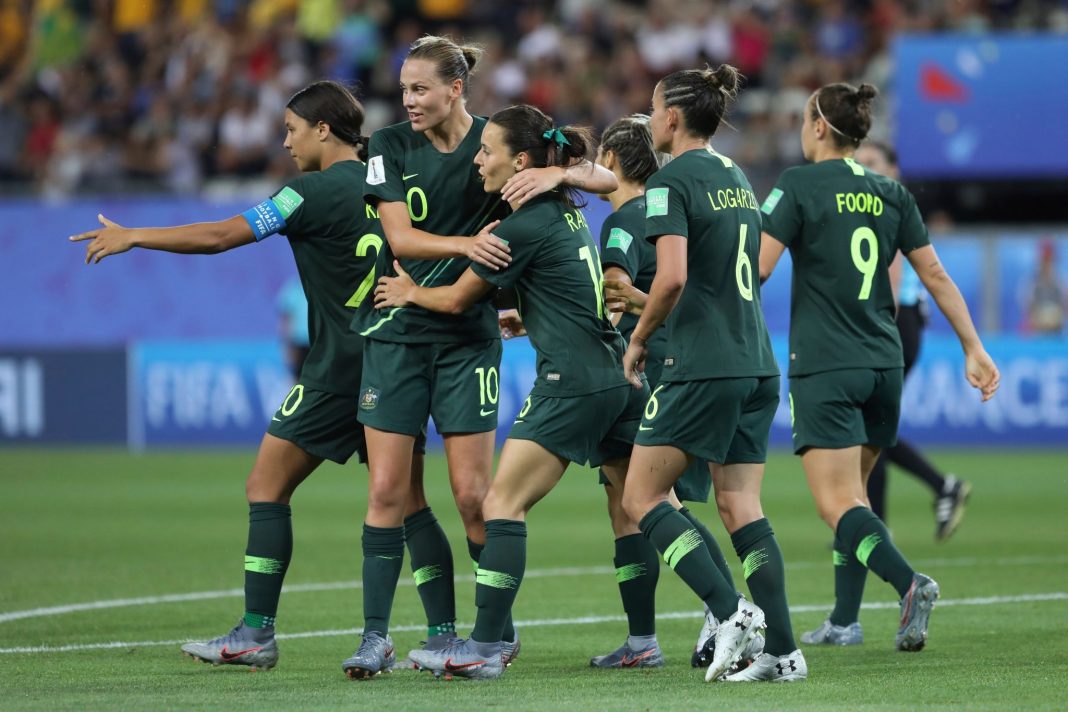
The Matildas will take on former World Cup winners Norway in their Women’s World Cup Round of 16 knockout match at the picturesque Stade de Nice on Saturday night (Sunday morning AEST).
With both teams coming off convincing wins in their final group stage matches, this looms as a fascinating contrast of styles and stories: the ultra-attacking Australia, their strikers haring around the front third to pressure defenders and goalkeepers into mistakes and missed passes, against the patient, persistent Norway, stern and stoic against the best teams in the world but able to take their chances at a moment’s notice.
The Matildas may welcome back first-choice centre-back Clare Polkinghorne, who looks to have recovered from a hamstring niggle suffered in the match against Italy. Polkinghorne’s return would see manager Ante Milicic reshuffle his starting XI, with Steph Catley likely to slot back into her preferred left fullback role, Elise Kellond-Knight potentially partnering Emily van Egmond in defensive midfield, and Katrina Gorry dropping back to the bench.
Despite leaving the stadium on crutches after injuring her ankle against Korea Republic, Norwegian winger Caroline Graham Hansen looks to be available for the match, with manager Martin Sjögren telling the media that Hansen had trained with the team and would play on the right side of midfield as usual.
Norway are also without their genuine superstar, Olympique Lyonnais striker and inaugural Ballon d’Or winner Ada Hegerberg, who stepped down from national team duty in 2017 in protest at pay and conditions currently offered by the NFF. While the team is undoubtedly poorer without Hegerberg – whose sister Andrine has also represented her country at senior level – Norway have shown throughout this tournament that they are able to block out the outside noise and focus their efforts into results on the pitch.
https://www.instagram.com/p/By_638HAi9e/
Road to France
With reigning European champions the Netherlands in their qualifying group, it would have been understandable if Norway never qualified for this tournament. The Dutch, still flying from their Euro 2017 win and back by more than 20,000 fans at each home game, were heavily fancied to waltz through the group and book their place in France.
However, after winning six of their first seven group games, and with Caroline Graham Hansen and Lisa-Marie Utland putting away 13 goals between them, Norway were flying. Having lost 1-0 to the Netherlands in Groningen, and with the Dutch slipping to a 0-0 draw to the Republic of Ireland, Norway went into their final match against the Dutch knowing only a win would take them to France. Scoring twice in the first ten minutes through Ingrid Engen and Isabell Herlovsen, Norway would hold on against an onslaught of Dutch attacks to win 2-1 in Oslo, and continue their run of having featured at every Women’s World Cup since its inception.
If You Know Your History…
Winners of the 1995 Women’s World Cup, Norway can claim to have been one of the most storied nations in international women’s football over the last three decades. Along with their world championship, Norway won European titles in 1987 and 1993, and an Olympic gold medal in 2000, as well as finishing runners-up in both the 1991 World Cup and four European Championships – in 1989, 1991, 2005, and 2013. Along with the country’s women’s handball team – Olympic gold medallists in 2008 and 2012 – they one of remain the most successful and celebrated national sporting teams in their homeland.
Despite their status as genuine giants of the women’s game, it’s unsurprising that the Matildas and Norway haven’t come up against each other too often over the years. With almost 16,000km separating the countries’ capitals, the simple fact of geography has seen meetings between the two nations usually reserved for major international tournaments. In fact, in the 30 years since their first meeting, the sides have only played six times, with Norway having the better of the ledger.
The sides’ meetings over the last decade – at the 2011 World Cup and the 2018 Algarve Cup – have both seen the Matildas come away with late wins, with an 87th-minute Kyah Simon goal in 2011 knocking Norway out in the group stage and sealing Australia’s progress to the second round.
https://www.instagram.com/p/BzAXJSZAZ4C/
Players to Watch
Maren Mjelde
Like so many players at the tournament, Norwegian captain and defensive rock Maren Mjelde was introduced to the elite level of club football at a young age. At just 16, Mjelde won her first club trophy in her début season, sealing promotion to the Norwegian Toppserien as undefeated champions with Arna-Bjørnar in 2005. Just two years later, aged just 18, Mjelde made her won her first international cap in a friendly against Russia.
With a total of ten seasons in the Norwegian top division under her belt – including two playing alongside W-League players Elise Thorsnes, Chloe Logarzo, Gema Simon, and Emily Gielnik at Avaldsnes – Mjelde signed for FAWSL side Chelsea in 2016. Playing mainly as a right wing-back or centre-half at club level, Mjelde came back from a chronic groin injury to lead her Chelsea side to the 2019 Champions League semi-final, losing 3-2 on aggregate to eventual winners Olympique Lyonnais.
At international level, Mjelde has become a mainstay at the back for her national team, both in World Cup qualifiers and the tournament itself. Alongside defensive partner and Chelsea teammate Maria Thorisdottir, Mjelde appeared in every qualification match – even getting on the scoresheet from the penalty spot in her side’s 6-1 rout of Slovakia. That partnership with Thorisdottir, as well as Mjelde’s command of her backline, will be key for a Norwegian team that has seemed happy to play on the counter throughout this World Cup – despite having 56% of the ball in their 2-1 loss to France, Norway managed just one shot on target. Whether manager Martin Sjögren’s side looks to mark Australia’s front three closely, or let them roam and mark more zonally, Mjelde will doubtlessly be called upon time and time again to step in and break up the Matildas’ potent attacking play.
Caitlin Foord
Another bona fide star introduced to the international scene as a schoolkid, Caitlin Foord has blossomed from the mercurial fullback we first saw at the 2011 World Cup in Germany to an attacking powerhouse blessed with both pace and precision anywhere in the front third. Currently plying her trade at NWSL club Portland Thorns, Foord is coming off the back of her best W-League season to date, scoring 10 goals in 14 games on her way to winning her second Championship with the club.
At international level, Foord has grown from a versatile squad player to a genuine attacking threat. Since recovering from the Lisfranc fracture that cost her the best part of a season, Foord has been playing and scoring regularly for the Matildas – her hat-trick against Chile in late 2018 was followed by a goal from the spot against Argentina and a mazy run and finish against the United States, as well as the goal before halftime against Brazil to spark Australia’s 3-2 comeback group stage win.
Comfortable on either wing and with both feet, Foord looms as a weapon in both attack and defence for the Matildas. Looking to pressure Norway’s defenders into mistakes close to their goals, Milicic will look to use Foord’s lightning speed and passing ability to profit from those potential errors and feed players like Sam Kerr and Tameka Yallop further up the park.
The Venue
The brand-spanking-new Stade de Nice is located on the outskirts of France’s seventh-largest city, sitting between the meandering Var river and the foothills of the Provence Prealps. Opened in 2013 and built to replace the 90-year-old Stade du Ray in the city’s northern suburbs, the stadium is covered in a geodesic mesh of steel and glass, giving it a striking silhouette against the cliffs and meadows surrounding it. With a capacity of just over 36,000 fans, the stadium is home to both Ligue 1 club OGC Nice and, occasionally, Top 14 rugby club Toulon, but is best remembered as the venue for one of European football’s greatest-ever upsets: Iceland’s 2-1 defeat of England in the knock-out stages of Euro 2016.
Match Details
Norway vs Australia
Date: Saturday 22 June
Venue: Stade de Nice, Nice
Kick-off: 9:00pm (local); Sunday 5:00am (AEST)
Broadcast: Live in Australia on SBS and Optus Sportus Sport






